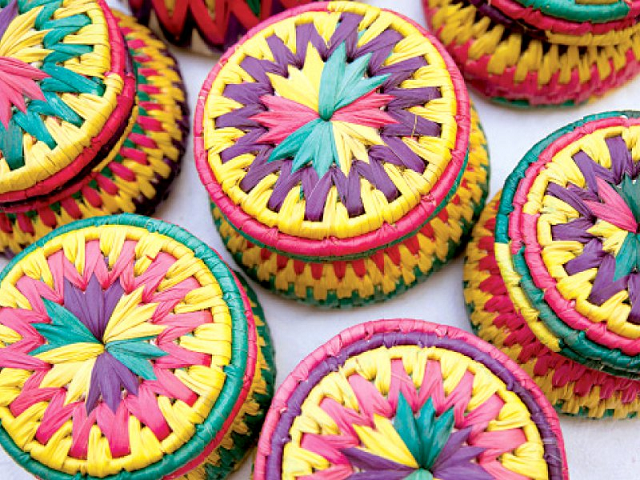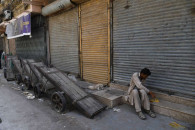Balochistan women entering socio-economic sphere
Local hotel buys Baloch woman’s 150 handmade embroidery pieces for decoration

Handmade cane boxes. PHOTO: MYRA IQBAL/EXPRESS
This was stated by Fatima Bibi, whose 150 pieces of handmade embroidery were bought by the management of Serena Hotel for decoration, during an event organised by the Food and Agriculture Organization (FAO).
Four million Balochistan women will not be able to vote in elections
Fatima said, "Our dreams of earning a decent living are coming true as we have started bearing fruit of our efforts. Though it is hard to manage between professions and household responsibilities, what we are getting in return is a great relief."
Fatima Bibi, who hails from Naushki, is one of the dozens of other creative women who displayed their embroidery and handicrafts at the event.
FAO Balochistan Chief Technical Adviser Marcel Stallen said, "Baloch women play a key role in the province's agriculture and livestock sectors, but despite their significant contribution, they receive inadequate remuneration in response.
Little space for women lawmakers in Balochistan
"Due to cultural and social taboos, women mostly have no share in income gained from crops, livestock or other products."
With the support of the Australian government, FAO, in collaboration with the government of Balochistan, has launched a couple of programmes in the province such as Australia Balochistan Agri-business Programme and Empowering Women in Balochistan through Agri-entrepreneurship.
The projects aim to empower women from Naushki, Chagai and Quetta districts through female enterprise development in the agri-sector.
He said, "Naturally, agriculture, livestock, handicrafts and embroidery, are the most potential areas in Balochistan where women can utilise their skills to earn their own income."
FAO team leader on women economic empowerment Asima Gulistan said, "The project is aimed at developing and strengthening agri-enterprises under women's ownership to make them financially independent so that they can improve their standard of living."
Typical female activities, she said, selected and supported by the project are; apricot processing, vegetable seedling production, poultry raising, sheep fattening and wool processing.
Deputy Programme Manager Ahmed Jan Essa said, "After having completed successful rounds of social mobilisation of women in far-flung bordering areas, we have moved towards economic empowerment of women."
Hazara women defy the odds
He said that the wool value chain had ample opportunities for rural women to earn their own income from wool shearing, washing, grading, spinning, carpet weaving, embroidery and handicraft production.
Essa said, “Under the Australian government-funded economic empowerment project, women have been trained to prepare sheep for shearing and later hand wash the sheared fleeces and grade, sort, spin and dye the wool.
"Once the wool goes through basic processing, it can be spun into yarn. The yarn can then be dyed and used in making carpets, which is also mostly done by women, and is a well-paying business."
"To increase the wool yields, protect fiber length and increase the efficiency of women, wool spinning wheels have been introduced to the women of rural areas for the ease of doing business on national standards.”
A farmer from Nauskhi Bibi Imam Khatoon said, "I have a poultry business but due to lack of knowledge and risk factors my business was not growing and the Australian programme has been of great help to me in improving my business."
Balochistan’s first female field officer breaks down barriers
Another farmer from Quetta, Bibi Musarrat said, “Due to the free mobility of women, who were earlier forced to stay at home due to social taboos, has also helped them to work shoulder to shoulder with men and learn from their experiences in business.”
A mother of four, 50-year-old Bani Bibi said, “I have been given a solar-operated wool spinning wheel which has greatly increased the efficiency of my work and without depending on electricity.
"Now I can spin one kilogramme of wool in an hour as compared to the traditional method of 250 grams in an hour. I can now easily earn Rs7,000 per month and help my family buy basic necessities of life.”
Balochistan Women Business Association President Sana Durani said, "I have 5,000 registered women in the association, but only 50 of them are doing business of embroidery, jewellery etc.
“Due to lack of resources and financial constraints, we cannot reach out to the women of rural areas of Balochistan. With the support of the government and FAO projects on empowering women, we will be able to reach out to many more women in the districts so that they can become entrepreneurs and start their own agri-business.”



















COMMENTS
Comments are moderated and generally will be posted if they are on-topic and not abusive.
For more information, please see our Comments FAQ